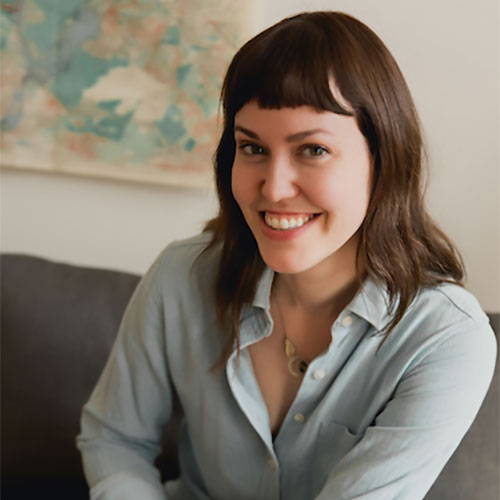THE BOOK DOCTOR
★ ★ ★ ★
CELEBRATE SMALL ENDINGS TO SAVOR THE BIG ACHIEVEMENTS

By Caroline Donahue
Reaching the end is often when we realize that endings are a silly point to celebrate. Recently, I finished the first complete draft of my novel. I phrase it this way because “first draft” is inaccurate; some parts of this draft have been written four or five times, while some sections were still unclear to me up to the moment I wrote them in this very draft.
I expected, as many writers do, that after three years of working on reaching the end of the story, that this moment would feel explosively joyful, like something big had happened, which wasn’t the case. Not to say that I wasn’t happy to reach the end of the book. I was — for about thirty minutes.
You see, we all want to have written and published a book. We want to have something to show for all the hard work we put into writing. But somewhere along the way, we get more attached to the end result than we are to the experience of creating it. It feels like finishing the book will result in enlightenment, or something similarly dramatic. I can tell you straightaway from the trenches that it doesn’t.
For one thing, the end is always the beginning of something else. Yes, I got to the end of my draft, but I am now at the beginning of revision. Once I reach the end of that, I will be at the beginning of copy editing, and then the beginning of pitching. Even when a book is sold, you still have the beginning of proofreading, typesetting, and then promoting. The beginnings keep coming. Even when you’ve finished the book tour, if you have one, the book will still need promoting as long as it’s in print. Saying a book is completely finished after it comes out is like saying you’re no longer a parent once your children leave home. You still have to believe in the book, make connections for it and try to get it into the hands of readers who will appreciate it. It will always be your book, well after you reach the end of writing it.
If this is the case, why are we so obsessed with endings and finishing? I love crossing an item off a to-do list more than most people and I live for late December when I get to reflect on a whole year of things crossed off and of projects (hopefully) completed. We are taught from a very young age that getting to the end of something is the point. Getting the degree, finishing the story, publishing the book. These are the goals you celebrate. These are the points when you will be happy, that is, if you reach these moments at all.
I think this is a mistake. I think our motivation causes us to miss out on the best part of the process. We squish and contort ourselves in order to get to the end, only to realize that we’ve missed the real meat of the experience. I was so hell-bent on chasing the high at the end of the past three years, that I glazed over when I sat down to write, whether it was the end of a scene, or even the end of a sentence I was pleased with. We must celebrate the smallest endings rather than the biggest ones, because this is what leads to real satisfaction.
If you’re rushing to get to the end of what you’re writing because you believe it will lead to acclaim, or validation from the outside world, you may get what you wish for, but I don’t think you’ll be as happy as you hoped. Instead, research has shown that our intrinsic motivation, that which drives us on no matter what result we get at the end, is the one that brings real happiness.
If you can slow down your focus and just look at each time you sit down and write as an occasion to feel satisfied with and proud of yourself, you will have a vastly richer experience than if you have to wait until the end. We are hugely out of practice at savoring our accomplishments. We barely note them as we go whizzing past on to a new beginning, thinking we did something wrong this time and that’s why we are a bit melancholy upon finishing the story or the draft, or the entire book.
Start early and savor often. Say “The end!” when finishing each writing session and give yourself permission to be excited every day you write. This will give you much more satisfaction and far more delight than if you’re only allowed to feel proud of what you’ve done upon completion.
And now we come to the end of my advice, so that you can begin celebrating your steps forward every day on every page. May you enjoy what you write, even the difficulties that come up, well before you’ve reached the final chapter.
This first step is to accept that the hunger to write needs to be acknowledged. If you dream of writing and don’t take this dream seriously, it will eat away at the rest of your life. All the other activities, engagements, and beautiful things that fill your days will begin to pile up in a nasty bucket entitled “Reasons I can’t write right now.” Don’t follow this path. I did it for over ten years, putting off writing until my life was just so and had plenty of space for staring out a window, seated behind a wide wood desk in an artfully torn sweater with a handmade mug filled with perfectly hot coffee. Spoiler alert: that day never came. It still hasn’t, so I had to accept as 40 was closing in on me that perhaps it was time to just get on with writing anyway.
Once you have accepted that your desire to write isn’t going away, you can address the question that is the most important:
How much time do you need in order to feel like you are making progress?
Hint: the answer does not have to be 8 hours a day, or even two. Or even one hour. As long as you are engaging with your work and taking steps forward, your writing will begin to feel fed, and so will you.
I have one client who dreamed of writing for years and now writes scenes in her phone on the train to work. A fifteen-minute train ride several days a week, where she adds to a list of scenes she imagines will be in the book, or writes a few paragraphs of a scene, is enough to stay connected to the story. It is no longer a story she might write someday. It is a book she is working on now. Right in the middle of a life as busy as anyone’s.
If you have an idea gnawing at you, start looking at your time. Where are there little moments you could connect with that idea? Do you have to wait in line? For trains or public transit? Do you get a lunch break? Could you take a little nibble in any of these windows?
This is a perfect time to confront your romanticized notions of what writing looks like. It might not happen in a notebook with a beautiful fountain pen. If you write a scene in your phone by sending yourself an email, guess what? It’s still writing. As I tell my students and clients constantly, no one ever picked up a book in a bookshop, flipped through it and then rejected it, thinking, “I’ll bet this author wrote that book in 5-minute chunks and has never been on a writer’s retreat by the ocean.”
Once your book is written, no one cares how you wrote it.
A confession: in my last job in Los Angeles, the land of no lunch breaks, before moving to Berlin, I got chunks of the novel written by walking the mile to work and dictating scenes into a voice recorder. Is this still writing? Absolutely.
Part of being a writer is figuring out how writing can fit into your life. This is essential. Your writing needs to be fed, or else it will start feeling on you. We’ve all been there: when the joy starts to leach out of things we once loved, when we start asking, “Is this all there is?” Don’t let it go that far. Stash a notebook in your purse, a tiny one will do, or open up a note file on your phone and write a few sentences. Tomorrow, write a few more. Go slow.
Your writing has waited for you a long time. You will figure out how to get your story written together.

Caroline Donahue is an American writer, podcaster, and English teacher living in Berlin. She is the host of The Secret Library podcast and co-host of GTFO pod. She is the co-editor of I Wrote it Anyway: An Anthology of Essays, and the author of Story Arcana : Using Tarot for Writing. She is currently at work on her first novel. Learn more at carolinedonahue.com

DEAR READER
At The Wild Word we are proud to present some of the best online writing around, as well as being a platform for new and emerging writers and artists.
If you have read the work in The Wild Word and like what we do, please put something in our tip jar.
THANK YOU FOR YOUR SUPPORT!
























Awesomeness!
This touched me and hit home. I’m going to share it with my writing friends. You’re advice is spot on!
It took me a long time of telling my writer friend once, twice, three times, four, that I wanted to write a book. Eventually, somewhere between golf swings, he said he didn’t want to hear it anymore. He essentially challenged me to just do it and stop talking about it. I did. That was in 2014. I’m still at work on it and your piece really hit home. The whole coming to end thing has been on my mind so your words come at just the right time.
Thanks so very much!